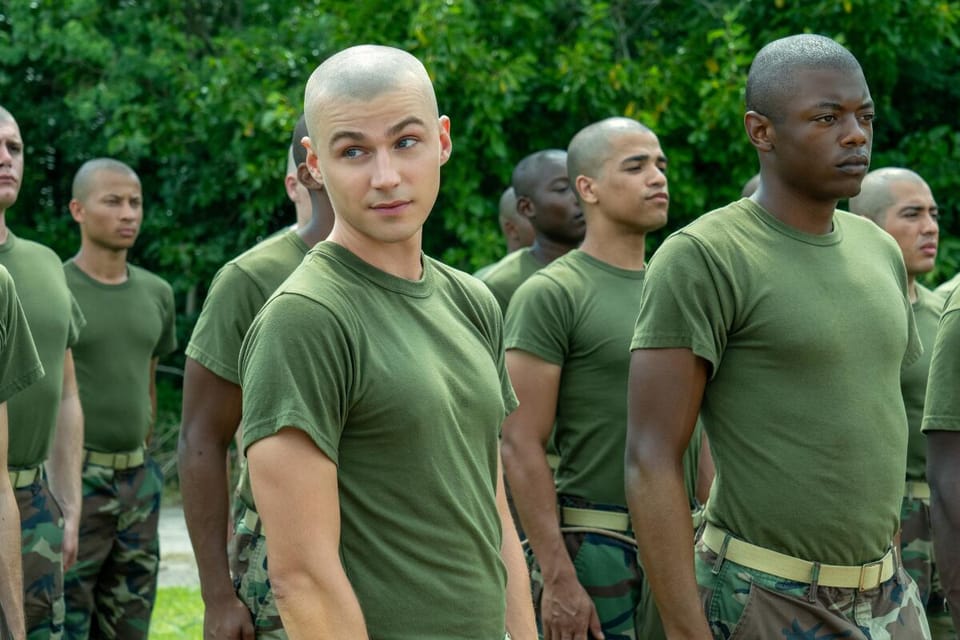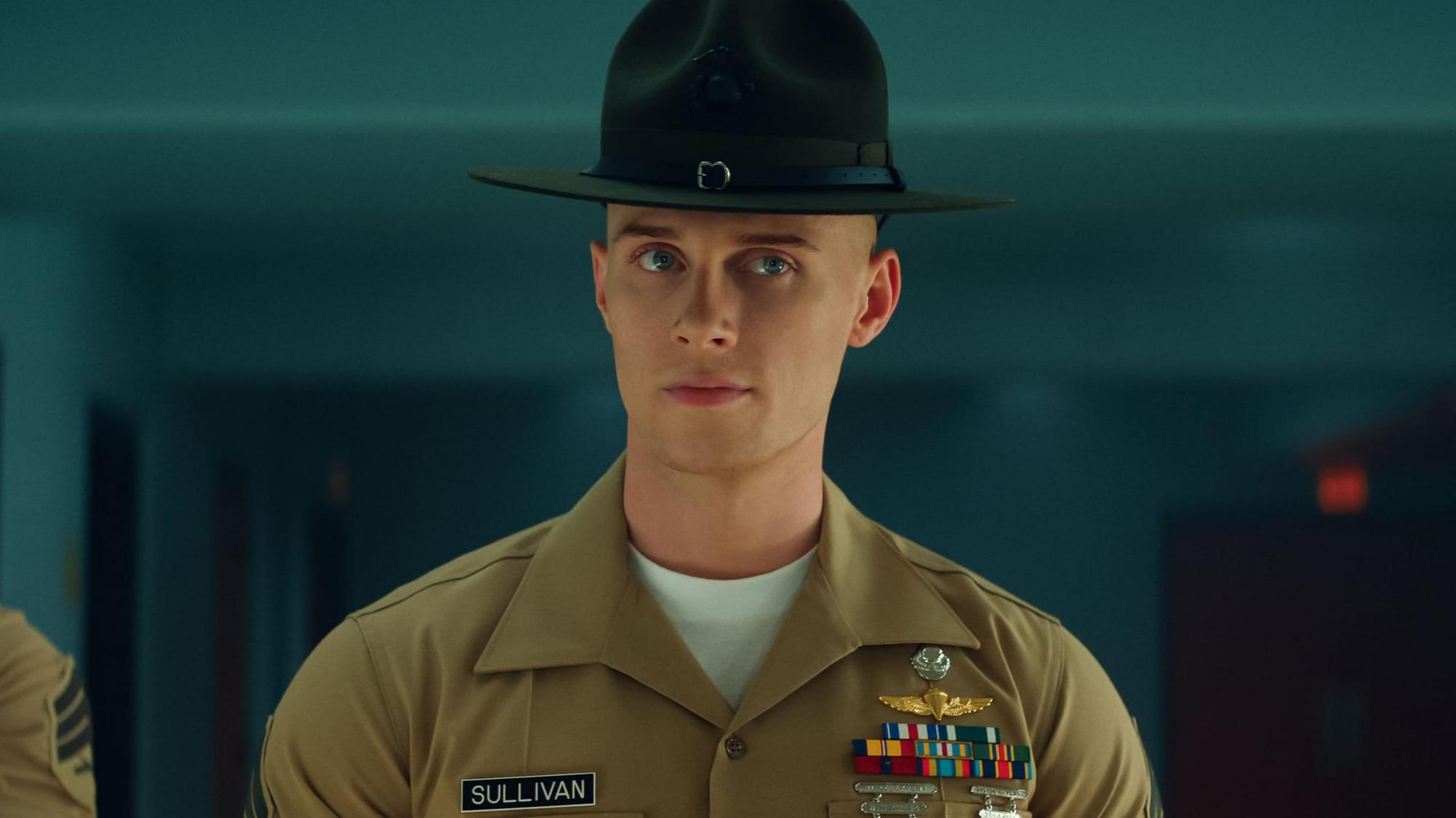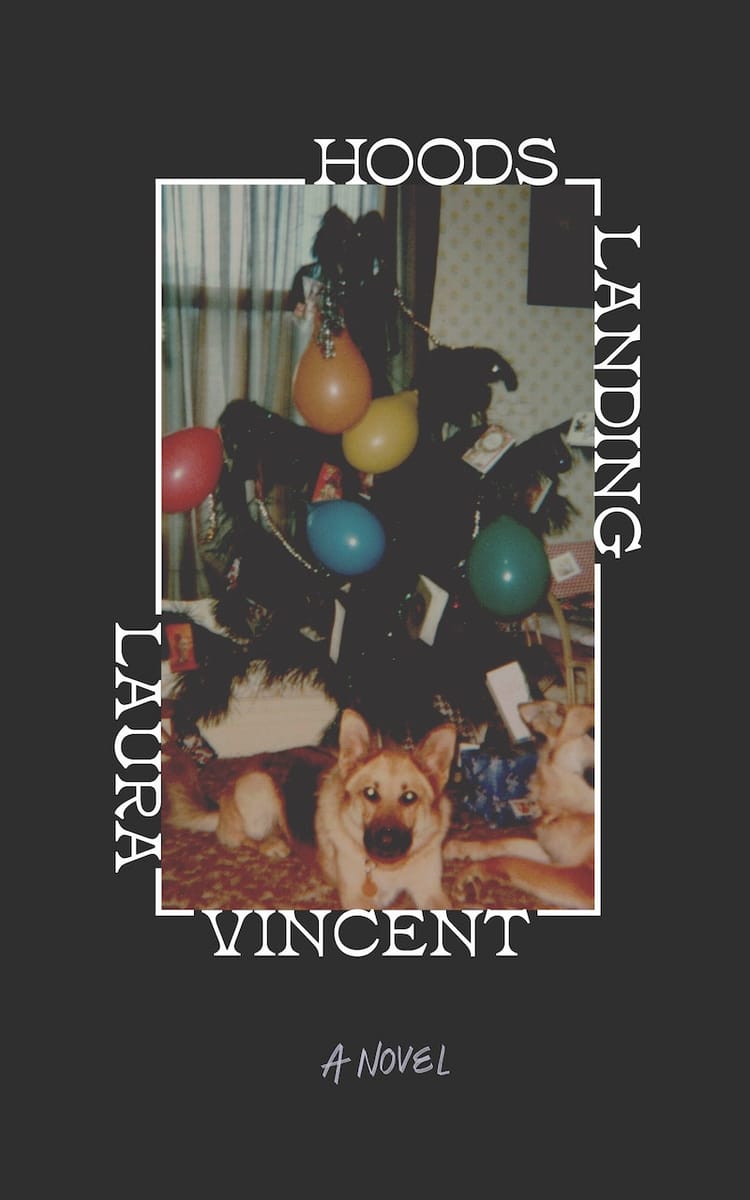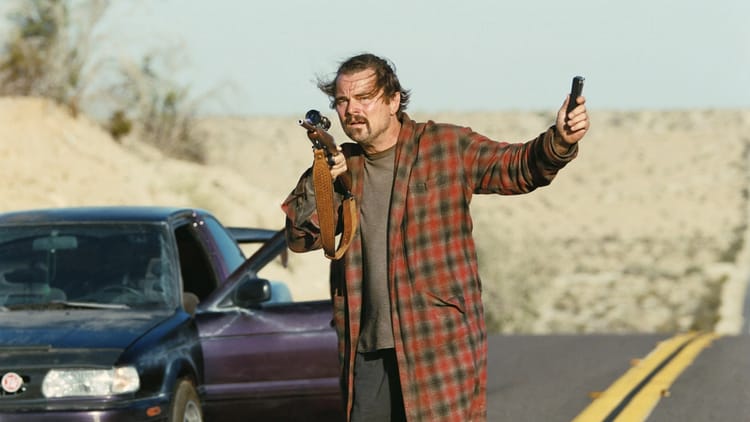Critical Corner: Boots

In this edition of Critical Corner, a review of Netflix’s muddled new gay-slash-military-slash-coming of age drama, Boots.
It took me a while while scrolling past the image on the carousel to realise what Boots was actually about. The series’ hero image is all bright colours – red, yellow, blue – with attractive young dudes doing all manner of physical activities. It looks all the world like another sports series. Upon very little reading, I found out that it isn’t an entertaining, all-male, follow-up to Bend it Like Beckham, but a series adaptation of The Pink Marine by Greg Cope White, a memoir about being gay in the US military in the 70s.
Netflix’s adaptation kicks the timeframe about 20 years down the road, and likely plays liberally with a lot of the other details of the memoir, and puts us in the world of Cameron Cope (Miles Heizer), a high school kid whose main character qualities appear to be “gay”, closely followed by “bullied”. He follows his straight best friend Ray (Liam Oh) to boot camp for the marines, and finds himself surrounded by the kaleidoscope of young men that find themselves drawn to that particular life.
The core concern of the series seems clear: How does Cameron – referred to by his last name, as is every character – exist as a gay man in an extremely heterosexual, masculine, and strict environment where he has to downplay, or even hide who he is? Unfortunately, Boots muddies the waters pretty much instantly, becoming less a series about Cope specifically dealing with the torturous environment, and more about Cope finding who he is as “a man” through the framework of the military. The rest of the cast – including a set of twins, several men of colour, a few macho men – tick off their own struggles on an episodic basis. There is, as to be expected, a lot of yelling.
The other plotline that serves as the backbone for Boots, follows the abusive Sergeant Sullivan (Max Parker), a decorated soldier who drills the potentials harder than anybody else. He is also, as is hinted at early on and quickly revealed, closeted and potentially fighting off allegations against his sexuality. While Heizer is charming enough as the lead, Parker provides the emotional backbone of the show. His performance is so physically precise, in a way that is initially terrifying but ultimately reveals itself to be heartbreaking; as rigidly as he’s keeping everybody else in line, he’s policing himself even harder.

Boots has a fascinating relationship to the two, eventually three, queer characters on the series, and queerness in general. Cope’s sexuality takes a backseat for six of the series’ eight episodes, none of his fellow soldiers give him a hard time for it after meeting him initially, and even though more of his character emerges over the first season, he remains a cipher. The series doesn’t seem to know where it stands to its characters, and how they experience their sexuality, which is even more disappointing given the series’ aurally explicit 1990 setting. It’s pre-“Don’t Ask, Don’t Tell”, sure, but for a show based on a book called The Pink Marine, it might as well call itself, The Marine who is also Pink.
It’s hard to watch Boots and not think of another Netflix series: Orange is the New Black. While that series is hardly talked about now, due to being (unfairly) relegated to the category of shows that rode hard and died slowly, it remains a turning point for streaming television. It, alongside House of Cards (fairly relegated to another category of shows that nobody talks about anymore), heralded the arrival of Netflix as a platform for original series rather than a destination for pre-existing films and television.
More crucially, and more relevantly to Boots, it brought an ensemble cast together, threw them at a concept that messed with tone and form, and never relented in its critique of the four walls that made up the series’ setting. Speaking of the ensemble, comparing this series’ cast to the one is particularly unkind, given how stacked that one was with theatre stalwarts, character actors and living legends, and how this one has literally 20 people with the same haircut and relatively little experience. If you left a season, hell, even an episode of Orange is the New Black, thinking that it was in any way in support of the carceral system, you probably weren’t actually paying attention.
Boots, on the other hand, seems confused as to where it stands in relation to the American military complex. Other than a small monologue from a wildly underused Vera Farmiga early on, Boots gives a limp thumbs-up to the military complex and what it can do for turning a man into a boy. That Cope comes out of the series feeling broadly positive of what he’s been through, despite some horrible life-changing things happening to his fellow cadets, puts a weird taste in my mouth. It’s not propaganda, but it’s too limp-wristed to be critique, and frankly too tonally bizarre to be an endorsement. In terms of tone and style, Boots feels less like the thing it wants to be, and more like the sports show it is superficially selling itself as.
Boots is currently streaming on Netflix.
Other Things I’ve Consumed
- I’ve been quite sick over the past week, which means I’ve had time to catch up on a lot of TV. So what follows are my general assessments:
The Celebrity Traitors UK: Stephen Fry is an idiot. The faithfuls are terrible at this game. I love Lucy Beaumont.
Elsbeth: The most enjoyable crime show on TV; Carrie Preston is an international treasure, and being able to see theatre people ham it up on a weekly basis is an absolute gift. Or, in my case, over two days.
Matlock: The ensemble of this show is wildly mixed (Ritter, Bridges great, everyone else varies from scene-to-scene), but it’s almost as much of a treat as Elsbeth is, and I don’t need to tell everyone how much of a treasure Kathy Bates is.
The Iris Affair: I watched half an hour of the first episode in Italian subtitles before realising it wasn’t meant to be in Italian. - I've been playing Two Point Campus, basically Theme Park/Hospital set in university campuses. I'm absolutely terrible at it but managed to beat it. It's low-stress, fun, and a perfect podcast game. Recommend if you're sick and have some podcasts to keep up with.
- Speaking of which, RePhrased, the Archer rewatch podcast hosted by Amber Nash (Pam) is delightful. Archer is core to my artistic DNA, and literally any insight into how it was made fills my cup.
Writing and reporting takes time, and if you want to support the amount of time it takes (and ensure that the scant amount of meaningful coverage of local art can continue), please considering supporting Dramatic Pause with a paid subscription ($8 p/m, $60 p/a) and if you can't afford a paid subscription, please share the work with your networks!





Member discussion